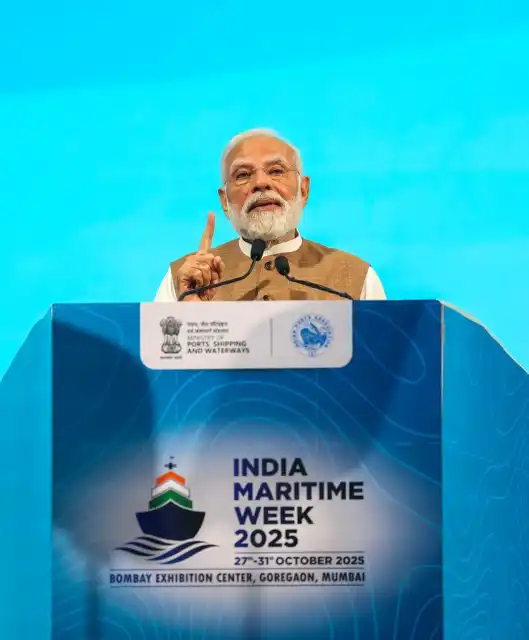Prime Minister Narendra Modi addressed the Maritime Leaders Conclave and chaired the Global Maritime CEO Forum during India Maritime Week 2025 in Mumbai, Maharashtra. The event drew participation from over 85 countries, including global shipping CEOs, policymakers, innovators, and representatives from small island nations. Modi said their presence reflected a shared vision for the future of maritime growth.
Global Confidence in India’s Maritime Strength
Several major projects and agreements worth lakhs of crores of rupees were launched at the conclave, a signal of global confidence in India’s maritime potential. Modi called 2025 a turning point for the sector and highlighted recent milestones. Vizhinjam Port, India’s first deep-water international trans-shipment hub, is now operational and recently received the world’s largest container vessel. Kandla Port has inaugurated the country’s first megawatt-scale green hydrogen facility, and Phase 2 of the Bharat Mumbai Container Terminal at JNPT has doubled capacity through the largest FDI in India’s port infrastructure, with key support from Singapore.

Modern Reforms for a Modern Maritime Sector
Modi noted that India has replaced colonial-era shipping laws with modern legislation designed for the 21st century. The new framework empowers state maritime boards, strengthens safety and sustainability, and expands digitization. Under the updated Merchant Shipping Act, Indian law now aligns with international maritime conventions, improving safety standards and ease of doing business while reducing bureaucratic delays. The new Coastal Shipping Act simplifies trade and logistics, ensuring balanced development along India’s coastline. Modi also introduced the One Nation, One Port Process to standardize procedures and significantly reduce documentation, making Indian ports faster and more efficient.
A Decade of Maritime Transformation
Under the Maritime India Vision, more than 150 initiatives have been launched in the past decade. Major ports have nearly doubled capacity, turnaround time has dropped, inland waterway cargo movement has risen by 700 percent, and operational waterways have increased from three to thirty-two. The net annual surplus of Indian ports has grown ninefold. Modi said India’s ports now rank among the most efficient in the developing world and, in many cases, outperform those in advanced economies.
Reviving India’s Shipbuilding Legacy
The Prime Minister emphasized that shipbuilding is now among India’s top priorities, recalling the country’s long maritime tradition, including the ship designs depicted in the Ajanta Caves. To revive that legacy, India has granted infrastructure status to large ships, making financing easier and cheaper. The government will invest ₹70,000 crore to expand domestic shipbuilding capacity, develop new shipyards, train maritime professionals, and create millions of jobs.
Expanding Port Capacity and Global Partnerships
A new mega port is under construction in Vadhavan, Maharashtra, at a cost of ₹76,000 crore. India is working to quadruple the capacity of its major ports and expand its share in global containerized cargo. Modi reaffirmed that India allows 100 percent FDI in ports and shipping and is rapidly expanding public-private partnerships. Under the Make in India, Make for the World vision, states are being encouraged to attract investments with strong incentives and infrastructure support.
India as a Steady Lighthouse in Global Trade
Modi described India as a steady lighthouse in a turbulent world. When global trade faces disruptions and uncertainty, he said, the world looks for stability, and India is ready to play that role. He highlighted the India–Middle East–Europe Economic Corridor as a transformative initiative that will redefine trade routes and promote clean energy logistics. He also underscored India’s commitment to inclusive maritime development, emphasizing support for Small Island Developing States and Least Developed Countries through technology, training, and infrastructure cooperation.
Focus on the Blue Economy and Sustainability
Looking ahead, Modi said the next 25 years will define India’s role in the global Blue Economy. The focus will be on sustainable coastal development, green logistics, port connectivity, and coastal industrial clusters. He invoked the maritime vision of Chhatrapati Shivaji Maharaj, who saw the seas not as boundaries but as gateways to opportunity, and said India continues to move forward with that same spirit.
